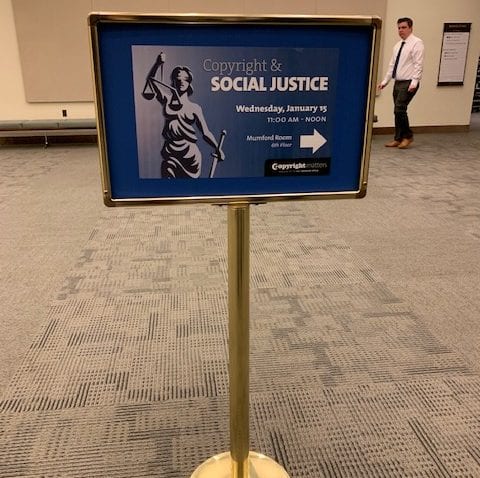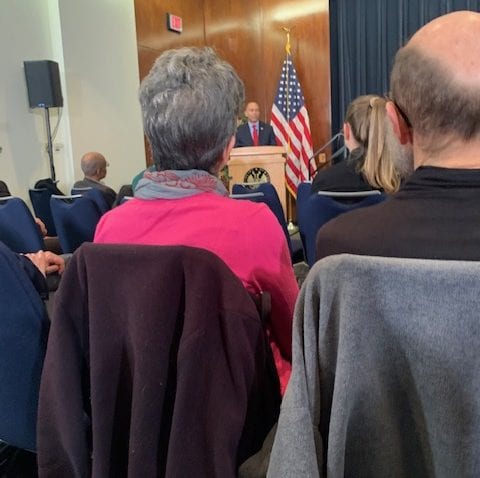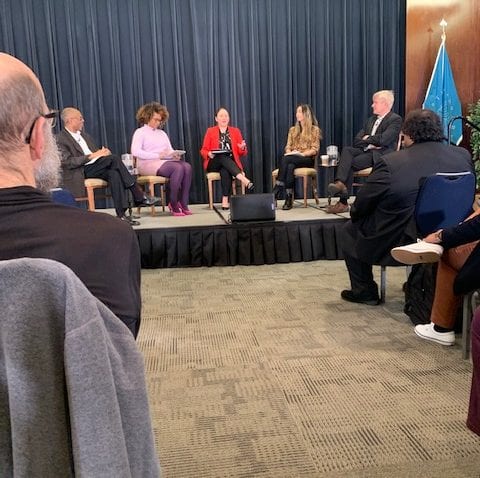For many, copyright and intellectual property legislation in the United States are weapons used by major producing companies and the wealthy, upper-class to establish and assert power over others’ intellectual property. Professor Lateef Mtima, Professor Robert Brauneis, Kim Tignor, and Grammy-nominated singer Hollis Wong-Wear all work to negate these and other misunderstandings of one of the most recognizable powers of the American government. They each dedicate a portion of their life’s work to utilizing copyright policy as a mechanism for social justice practice and change across the country.

On the morning of January 15th, I attended a ‘Copyright Matters’ event entitled ‘Copyright and Social Justice’ put on by the United States Copyright Office at the James Madison Memorial Building in the Library of Congress. Representative Hakeem Jeffries, of the eighth congressional district of New York, gave a powerful introduction to the event. Jeffries played a key role in the passing of the 2018 Music Modernization Act which aims to improve the licensing process so that songwriters, artists, and musicians can continue to share their creativity with anyone they choose.[1] Congressman Jeffries emphasized the power that this act and, more broadly, rights to intellectual property have on affirming the identity and importance of marginalized communities in the United States. He particularly focused on the powers awarded to the legislative branch of government by the US Constitution. Article I, Section VIII, Clause VIII of the United States Constitution states that “The Congress shall have the power… to promote the progress of science and useful arts, by securing for limited times to authors and inventors the exclusive right to their respective writings and discoveries.”[2] Jeffries believes that congress has a duty, as some of the country’s main legislators, to protect the works of all of America’s citizens. With this clause in mind, a theme that persisted throughout the lecture was the necessity to utilize space of copyright for marginalized communities and the centrality it has to incentivizing creators to share their creative brilliance with the world around them.

Representative Jeffries (D-NY) giving opening remarks
The panelists covered a significant amount of ground in a short amount of time. Here, I thought I would share some of the most powerful points that were made. Copyright becomes a social justice issue when access to the system and/ or access to the fruits of one’s artistic endeavors are compromised. Often, historically marginalized artists and creators, who are fundamental to the growth and development of America’s creative economy, lack two basic skills: the ability to make educated decisions about their intellectual property and the knowledge of the value of their own art. The panelists unanimously felt that the best way to combat these thought processes is through education. Professor Mtima stressed the importance of dispelling the common myth that copyright is an enemy to artistic expression. Furthermore, he emphasized the idea that everyone’s artistic products have intrinsic and inherent value which deserve to be registered, copyrighted material.
One of the final points made throughout the discussion has resonated most with me as I sit and reflect on my unique experience. One audience member asked a powerful question: how can we be responsible users and consumers of copyrighted material? Everyone consumes copyrighted material. All creative material is copyright, whether registered or not. Registration only allows the artists to significantly enhance or strengthen the protection one is afforded by copyright policy.[3] Everyone is both a user and a creator of copyright. Professor Mtima encouraged members of the audience to consider a simple concept. What they do to someone else’s work, while being a consumer of copyrighted material, can and will likely be done to their own work at some point in time. An item doesn’t have intrinsic value because of its popularity. A product of your own artistic endeavors is valid and legitimate because it is a unique product of an individual that helps shape the definition of arts in American culture.

Copyright Matters panelists. From right to left, Professor Lateef Mtima, Kim Tignor, discussion leader, Hollis Wong-Wear, and Professor Robert Brauneis.
Throughout our group site visits thus far, equity, diversity, and inclusion are prominent themes that have taken center stage in all our discussions. Every single non-profit organization, special interest group, and government agency we have met with has emphasized the power of these themes in the current, American society as a force that is driving social, political, and cultural change. It is undeniable to me that equity, diversity, and inclusion are inextricably tied to the ever-changing definition of America’s cultural identity. I choose now to echo sentiments from an earlier blog post of mine. America’s culture is fundamentally defined by the arts and the works of creators, but also those who consume other’s creations. The intention of copyright is only satisfied when it acts as an incentive to create. Copyright offers protection for anyone and everyone’s artistic endeavors and creations. It is not policy that should be feared. Rather, it should be a mechanism that anyone can use to further their confidence in their contributions to the creative economy of America.
[1] “Biography.” Congressman Hakeem Jeffries, March 13, 2019. https://jeffries.house.gov/about/full-biography.
[2] U.S. Constitution art. I, sec. VIII, cl. VIII.
[3] Stim, Richard. “Copyright Protection: What It Is, How It Works.” Stanford Copyright and Fair Use Center, December 4, 2019. https://fairuse.stanford.edu/overview/faqs/copyright-protection/.
